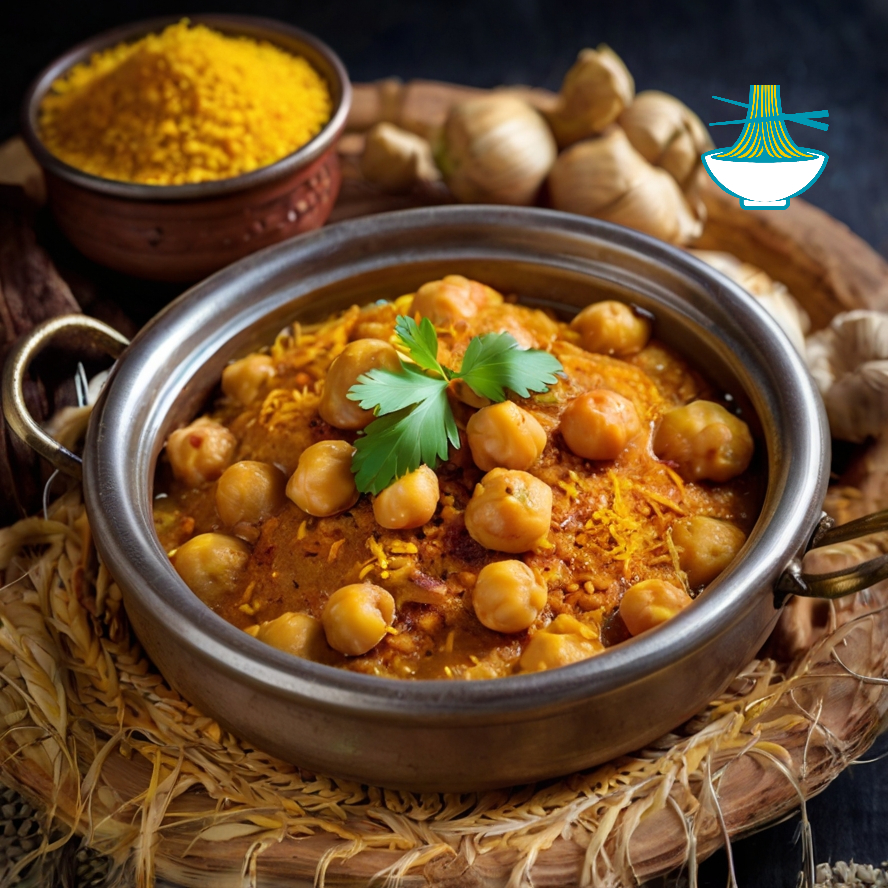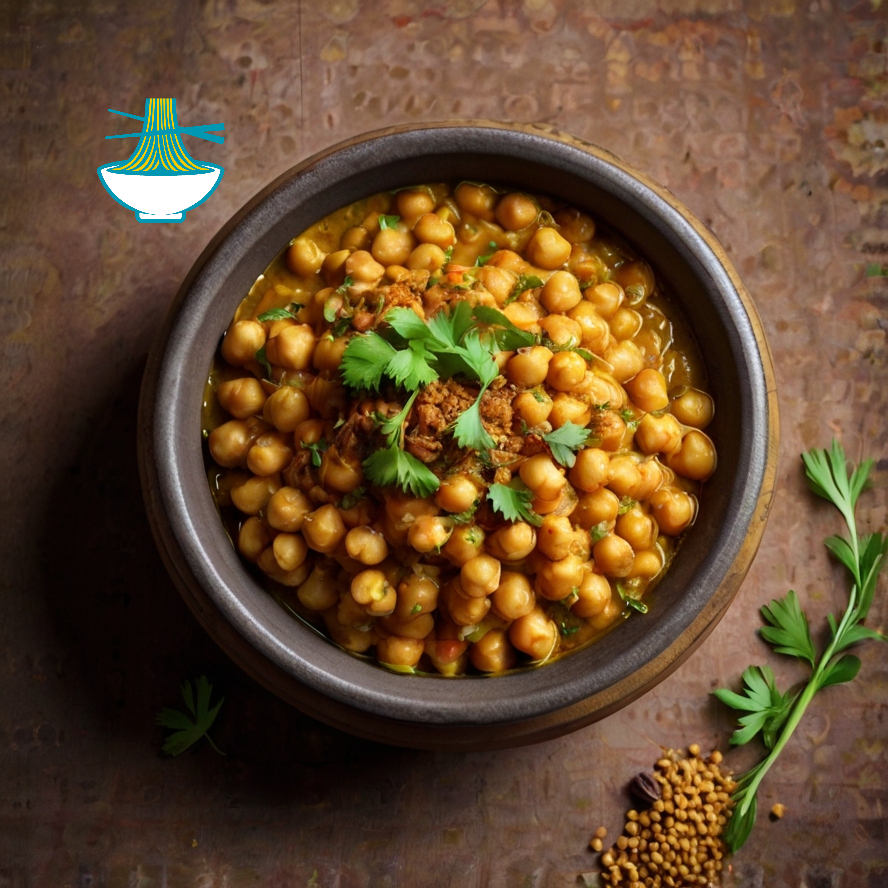Borozgan, a cherished Middle Eastern dish, combines semolina, chickpeas, and tender meat, seasoned with aromatic cumin and coriander. Originating from ancient culinary traditions, its rich history reflects the diverse influences of the region, evolving into a beloved staple enjoyed for generations.
Ingredients:
- 1 cup semolina
- 1 cup cooked chickpeas
- 250g meat (beef or lamb), diced
- 1 onion, finely chopped
- 2 cloves garlic, minced
- 1 teaspoon ground cumin
- 1 teaspoon ground coriander
- Salt and pepper to taste
- Olive oil for cooking
- Chopped fresh parsley for garnish (optional)
Method:
1. Heat olive oil in a large skillet over medium heat. Add chopped onion and minced garlic, sauté until translucent.
2. Add diced meat to the skillet, season with salt, pepper, ground cumin, and ground coriander. Cook until browned on all sides.
3. Stir in cooked chickpeas and continue to cook for a few minutes.
4. In a separate pot, bring water to a boil. Gradually add semolina while stirring continuously to prevent clumping.
5. Once all the semolina is added, reduce heat to low and continue stirring until it thickens and pulls away from the sides of the pot.
6. Spread a layer of cooked semolina in a serving dish. Top with the meat and chickpea mixture.
7. Optionally, garnish with chopped fresh parsley before serving.
Enjoy your delicious Borozgan!
Nutrition Value:
1. Semolina:
- Calories: Approximately 601 kcal per cup
- Carbohydrates: About 122 grams
- Protein: Around 21 grams
- Fat: Roughly 1.7 grams
- Sodium: Minimal
- Cholesterol: None
- Vitamins and Minerals: Contains significant amounts of B vitamins, iron, and magnesium.
- Nutritional Benefit: Semolina provides energy from complex carbohydrates and contributes to the intake of essential vitamins and minerals, supporting overall health and vitality.
2. Cooked Chickpeas-:
- Calories: Approximately 269 kcal per cup
- Carbohydrates: About 45 grams
- Protein: Around 15 grams
- Fat: Roughly 4 grams
- Sodium: Minimal
- Cholesterol: None
- Vitamins and Minerals: Rich in fiber, folate, iron, phosphorus, and manganese.
- Nutritional Benefit: Chickpeas are an excellent source of plant-based protein, fiber, and various essential nutrients, promoting digestive health and satiety.
3. Meat (Beef or Lamb):
- Calories: Varies depending on cut and fat content (approximately 300-400 kcal per 100g)
- Carbohydrates: Negligible
- Protein: Around 25-30 grams per 100g
- Fat: Varies (consider lean cuts for lower fat content)
- Sodium: Varies
- Cholesterol: Varies (lean cuts tend to have lower cholesterol)
- Vitamins and Minerals: Rich in protein, iron, zinc, and B vitamins.
- Nutritional Benefit: Meat provides high-quality protein and essential nutrients necessary for muscle repair, immune function, and overall health.
4. Onion:
- Calories: Approximately 44 kcal per 100g
- Carbohydrates: About 10 grams
- Protein: Around 1 gram
- Fat: Minimal
- Sodium: Minimal
- Cholesterol: None
- Vitamins and Minerals: Contains vitamin C, vitamin B6, folate, and potassium.
- Nutritional Benefit: Onions are low in calories and rich in antioxidants, vitamins, and minerals, offering anti-inflammatory and immune-boosting properties.
5. Garlic:
- Calories: Approximately 149 kcal per 100g
- Carbohydrates: About 33 grams
- Protein: Around 6 grams
- Fat: Minimal
- Sodium: Minimal
- Cholesterol: None
- Vitamins and Minerals: Contains vitamin C, vitamin B6, manganese, and selenium.
- Nutritional Benefit: Garlic is renowned for its potential health benefits, including immune support, heart health, and antibacterial properties.
6. Ground Cumin:
- Calories: Approximately 375 kcal per 100g
- Carbohydrates: About 44 grams
- Protein: Around 18 grams
- Fat: Roughly 22 grams
- Sodium: Minimal
- Cholesterol: None
- Vitamins and Minerals: Contains iron, magnesium, and calcium.
- Nutritional Benefit: Cumin is rich in antioxidants and may aid digestion, improve blood sugar control, and promote weight loss.
7. Ground Coriander:
- Calories: Approximately 298 kcal per 100g
- Carbohydrates: About 54 grams
- Protein: Around 12 grams
- Fat: Roughly 17 grams
- Sodium: Minimal
- Cholesterol: None
- Vitamins and Minerals: Contains vitamin C, vitamin K, and manganese.
- Nutritional Benefit: Coriander offers antioxidant properties and may have anti-inflammatory effects, supporting digestive health and overall well-being.
8. Salt and Pepper:
- Calories: Negligible
- Carbohydrates: Minimal
- Protein: Minimal
- Fat: Minimal
- Sodium: Contains sodium
- Cholesterol: None
- Vitamins and Minerals: None in significant amounts
- Nutritional Benefit: Provides flavor enhancement but should be used in moderation to control sodium intake.
9. Olive Oi:
- Calories: Approximately 884 kcal per 100g
- Carbohydrates: Negligible
- Protein: Negligible
- Fat: Around 100 grams
- Sodium: Minimal
- Cholesterol: None
- Vitamins and Minerals: Contains vitamin E and vitamin K.
- Nutritional Benefit: Olive oil is rich in monounsaturated fats and antioxidants, promoting heart health and reducing inflammation when used in moderation.
10. Chopped Fresh Parsley (Optional):
- Calories: Approximately 36 kcal per 100g
- Carbohydrates: About 7 grams
- Protein: Around 3 grams
- Fat: Roughly 1 gram
- Sodium: Minimal
- Cholesterol: None
- Vitamins and Minerals: Rich in vitamin K, vitamin C, and vitamin A.
- Nutritional Benefit: Parsley is a good source of antioxidants and vitamin K, supporting bone health and immune function.
These nutritional components contribute to a balanced diet when consumed as part of a varied and diverse meal plan.


Comments